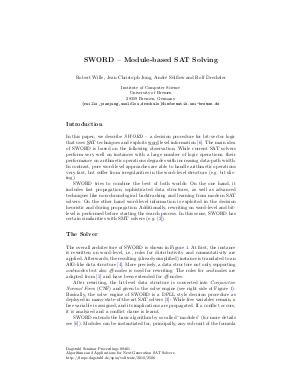SWORD – Module-based SAT Solving
Authors Robert Wille, Jean Christoph Jung, Andre Sülflow, Rolf Drechsler
-
Part of:
Volume:
Dagstuhl Seminar Proceedings, Volume 9461
Part of: Series: Dagstuhl Seminar Proceedings (DagSemProc) - License:
 Creative Commons Attribution 4.0 International license
Creative Commons Attribution 4.0 International license
- Publication Date: 2010-03-17
File

PDF
DagSemProc.09461.5.pdf
- Filesize: 85 kB
- 2 pages
Document Identifiers
Subject Classification
Keywords
- SAT Solver
- Word Level
- SAT Modulo Theories
Metrics
- Access Statistics
-
Total Accesses (updated on a weekly basis)
0Document
0Metadata
Abstract
In the paper, SWORD is described – a decision procedure for bit-vector logic that uses SAT techniques and exploits word level information. The main idea of SWORD is based on the following observation: While current SAT solvers perform very well on instances with a large number of logic operations, their performance on arithmetic operations degrades with increasing data-path width. In contrast, pure word-level approaches are able to handle arithmetic operations very fast, but suffer from irregularities in the word-level structure (e.g. bit slicing). SWORD tries to combine the best of both worlds: On the one hand, it includes fast propagation, sophisticated data structures, as well as advanced techniques like non-chronological backtracking and learning from modern SAT solvers. On the other hand word-level information is exploited in the decision heuristic and during propagation.
Cite As Get BibTex
Robert Wille, Jean Christoph Jung, Andre Sülflow, and Rolf Drechsler. SWORD – Module-based SAT Solving. In Algorithms and Applications for Next Generation SAT Solvers. Dagstuhl Seminar Proceedings, Volume 9461, pp. 1-2, Schloss Dagstuhl – Leibniz-Zentrum für Informatik (2010)
https://doi.org/10.4230/DagSemProc.09461.5
BibTex
@InProceedings{wille_et_al:DagSemProc.09461.5,
author = {Wille, Robert and Jung, Jean Christoph and S\"{u}lflow, Andre and Drechsler, Rolf},
title = {{SWORD – Module-based SAT Solving}},
booktitle = {Algorithms and Applications for Next Generation SAT Solvers},
pages = {1--2},
series = {Dagstuhl Seminar Proceedings (DagSemProc)},
ISSN = {1862-4405},
year = {2010},
volume = {9461},
editor = {Bernd Becker and Valeria Bertacoo and Rolf Drechsler and Masahiro Fujita},
publisher = {Schloss Dagstuhl -- Leibniz-Zentrum f{\"u}r Informatik},
address = {Dagstuhl, Germany},
URL = {https://drops.dagstuhl.de/entities/document/10.4230/DagSemProc.09461.5},
URN = {urn:nbn:de:0030-drops-25069},
doi = {10.4230/DagSemProc.09461.5},
annote = {Keywords: SAT Solver, Word Level, SAT Modulo Theories}
}
